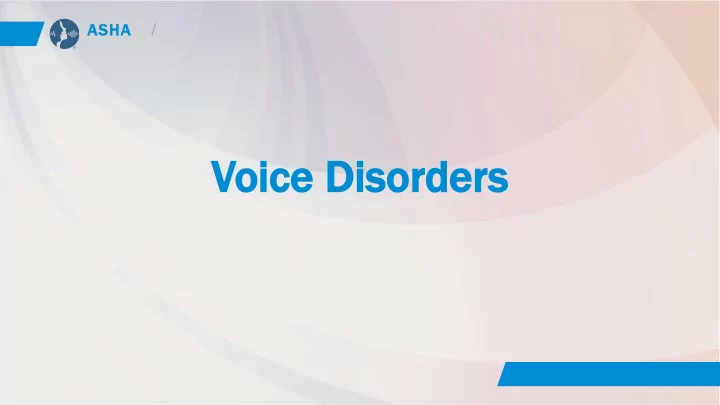

ASHA / Voic oice Diso e Disord rder ers
ASHA / Ho How do do w we pr prod oduce ce voi oice ce? • You have two vocal cords, also called vocal folds, in your larynx, or voicebox. • When you talk, air comes from your lungs, through your vocal cords. • Your vocal cords vibrate to produce sound. • If one or both vocal cords are not working the right way, you will have voice problems.
ASHA / Di Diag agram ram of of V Voc ocal al Co Cord rds
ASHA / Wh What at do does s a v a voi oice ce dis disor order der so sound nd lik like? e? • If you have a voice disorder, you may sound hoarse or breathy – like you are talking out of your nose, called hypernasality – like you have a cold and are stuffed up, called hyponasality – like your voice is too high or too low, called a pitch problem – like you are talking too loudly or too softly. • You may lose your voice when you are speaking.
ASHA / Wh Why y do does s my v y voi oice ce so sound nd th this is way? y? • Voice disorders may be caused by – growths like calluses on the vocal cords, called nodules – swelling or bumps like blisters on the vocal cords, called polyps – vocal cord paralysis where one or both cords do not move – vocal cords shutting when they should open, caused by paradoxical vocal fold movement – a condition called spasmodic dysphonia that causes a jerky or tight sounding voice that sometimes sound fine
ASHA / Wh Why y do does s my v y voi oice ce so sound nd th this is way? y? (co continued) ntinued) • You may develop a voice disorder because of – allergies – large tonsils or adenoids – smoking – illnesses, like respiratory infections – poor voice habits
ASHA / Ho How w ca can n I pr protect ct my v y voi oice ce? • To keep your voice healthy – try not to shout or scream a lot or to talk in noisy places – use a voice amplifier or microphone when you speak to large groups ― drink plenty of water – avoid alcohol, caffeine, smoking, and breathing chemical fumes – try not to clear your throat too much
ASHA / Ho How Can an I Protect ect My V y Voi oice ce? (co contin ntinued) ued) • See a doctor if you have allergies or sinus or respiratory infections. • Control gastroesophageal reflux disease (GERD or heartburn) with diet or medications.
ASHA / Wh When sho n should ld I ca call ll my d y doc octor? or? • See your doctor if – your voice is hoarse, sounds different to you, or if it is painful to talk for more than 2-3 weeks – you lose your voice easily when talking – you have to work hard to speak loudly enough to be heard
ASHA / Wh When sho n should ld I ca call ll my d y doc octor? or? (co contin ntinued) ued) • Your doctor may want you to see an ear, nose, and throat doctor, or ENT. – The ENT can look at your vocal cords to see if there are any problems.
ASHA / Wh What at do does s a spe a speech-lan langua guage ge pa path thol ologist ogist do do f for or a v a voi oice ce dis disor orde der? r? • A speech-language pathologist, or SLP, will – ask you about how you use your voice and what problems you are having – listen to you talk and test your voice – work with you to improve your voice – help you learn good voice habits
ASHA / Ho How w ca can n I find ind an an SL SLP? • Look for an SLP with the Certificate of Clinical Competence from ASHA – Will have “CCC - SLP” after his or her name. • Go to the ASHA Web site at www.asha.org and click on “Find a Professional” at the top of the page. • Call ASHA at (800) 638-8255 or e-mail actioncenter@asha.org.
ASHA / For or Mor ore e Inf nformat ormation ion • To learn more about voice disorders and what SLPs do, go to the ASHA Web site at www.asha.org/public. • To learn more about what ENTs do, go to www.entnet.org.
Recommend
More recommend